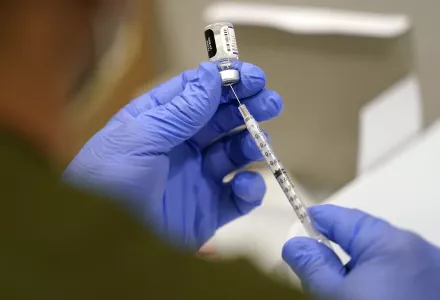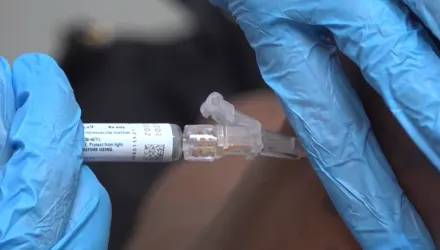Just seven months ago, while five months pregnant, I rolled up my sleeve to receive my updated COVID-19 vaccine. I delivered my baby in March 2025. That same fall, I also made sure my older children were vaccinated against COVID-19 alongside their annual flu shots. As an epidemiologist, a mother, and someone who has spent my career preparing for and responding to infectious disease threats, I followed the science, not politics. I know the data: COVID-19 vaccination saves lives, prevents severe illness, and protects the most vulnerable including babies too young to be vaccinated themselves.
That’s why the decision by Health and Human Services Secretary Robert F. Kennedy Jr. to remove COVID-19 vaccines from the CDC’s immunization schedule for healthy pregnant women and children is profoundly alarming.
It undermines medical evidence, circumvents longstanding public health processes, and threatens access to vaccines for millions of Americans.
A Reckless Break from Process
The announcement was made via social media without consulting the CDC’s Advisory Committee on Immunization Practices (ACIP), the independent body that reviews data and makes evidence-based vaccine recommendations. This advisory process exists to ensure transparency, expert review, and public trust. Overriding it erodes institutional integrity and risks setting a precedent where future decisions are shaped by ideology, not epidemiology. Instead, the nation’s top health official bypassed this process with a 58-second video announcement.
This breach of protocol doesn’t just flout scientific norms, it threatens to destabilize vaccine infrastructure. Without a formal CDC recommendation, insurance coverage could become inconsistent, and access through safety-net programs like Vaccines for Children may be disrupted. It’s a move that could widen health disparities and introduce unnecessary barriers to care.
Contradicting the Evidence
The science is clear: COVID-19 infection during pregnancy increases the risk of ICU admission, mechanical ventilation, preterm birth, stillbirth, and even maternal death. Vaccination, by contrast, significantly reduces these risks and also transfers protective antibodies to the infant, shielding them for the first few months of life when they are most vulnerable.
For young children, while severe outcomes from COVID-19 may be less common than in older adults, they are far from negligible. A significant portion of hospitalized children had no underlying conditions. Vaccination reduces the risks of hospitalization, long COVID, and multisystem inflammatory syndrome in children (MIS-C).
A CDC analysis found that most infants hospitalized with COVID-19 were born to unvaccinated mothers. Meanwhile, vaccinated children, even those at lower risk, gain meaningful protection, particularly during waves driven by newer variants.
This policy change isn’t just out of step with the CDC’s own data, it also contradicts the FDA’s recent guidance acknowledging pregnancy as a high-risk condition for severe COVID-19. To suggest there is no benefit for vaccinating healthy children and pregnant women is not only inaccurate, it’s dangerous.
A Blow to Public Health Autonomy
Though framed as a move to support personal choice, this policy actually increases obstacles for families and clinicians alike. Providers may hesitate to offer the vaccine. Pharmacists may decline to stock it. Insurers may question whether to cover it. These ripple effects complicate access, create confusion, and ultimately make it harder for people to protect themselves and their children.
Public health policy should not be dictated by social media posts. It should be anchored in scientific rigor, expert deliberation, and public accountability. That process was not respected here.
We Must Do Better—for Families, for Public Health
I am deeply concerned about the precedent this sets. In my work responding to emerging infectious diseases from Ebola to COVID-19, I’ve seen how critical trust and access are to public health success. Undermining either, let alone both, invites inequity, confusion, and preventable suffering.
The erosion of trust in vaccines is not new, but this direct attack on evidence-based maternal and pediatric care is unprecedented. If politically motivated decisions are allowed to override science, the consequences won’t just be measured in headlines, they’ll be measured in hospitalizations, complications, and lives lost.




